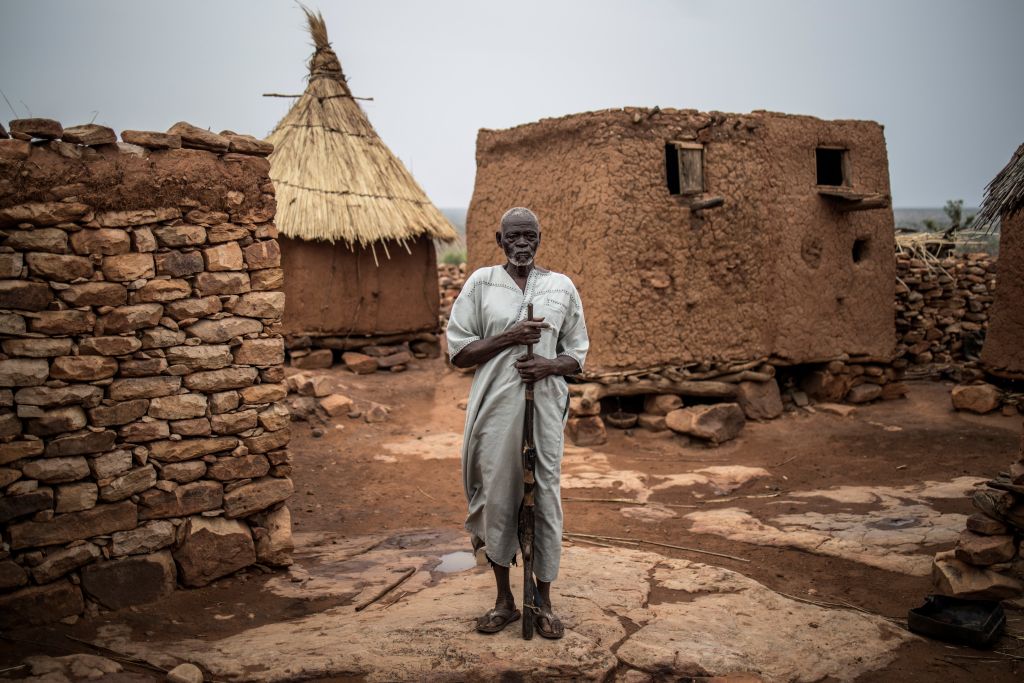Mali’s Dogon Country Destabilized by Land Disputes, Terrorism
ADF STAFF
Persistent drought that led to a massive loss of farmland has fueled tensions between militias in Mali’s Dogon country since 2015.
Dogon refers to parts of the central Mopti region as well as an ethnic group of indigenous people who frequently clash with the Fulani ethnic group. Lack of rainfall means farmers need more land to make ends meet, and they are sometimes forced to pay money to protect the land they work. The land is often taken if farmers don’t pay for protection.
“This is a conflict of two sides: you have the religious jihadists and the non-religious ‘self-defense’ groups,” according to Dr. Ibrahima Poudiougou, who published a report about the subject on the website of Leiden University in the Netherlands. “Both try to gain control over the peasant land to secure their political position in the country, and this certainly does not exclude violence or the threat of violence. Both groups see their own violence as a form of protection against the other group’s violence.”
In Mali, only the government is seen as the rightful owner of land, while farmers are viewed as customary users. In many areas armed groups charge fees to impoverished farmers to access farmland.
The rural migration of farmers exacerbates the issue. Hunger spurs them to move from village to village in search of suitable land. Abandoning land they acquired allows militias to offer protection for a price.
“Either they pay a large sum of money to have the land protected, or the militias put the land under embargo until the claimed amount is paid,” Poudiougou wrote.
Role of Extremist Groups
Roots of the land disputes in the Mopti region coincide with the growing prominence of violent extremist groups, which has strained relations between the Dogon and Peuhl communities since 2015. Members of the Dogon community accuse the Peuhls of supporting violent extremist organizations linked to terrorist groups in northern Mali, while the Peuhls accuse the Dogons of supporting state forces. Extremist groups exploit tensions between the communities to sow chaos and recruit new members.
Violence reached a fever pitch when as many as 270 people were killed in a pair of massacres in 2019.
In March of that year, at least 134 villagers in Ogossogou’s Peuhl community died in an attack that claimed the lives of pregnant women, children and the elderly.
At least 95 people were killed in an overnight attack on a Dogon village less than two months later. The village is home to a Dogon group known as Dan Na Ambassagou that was blamed for the March attack.
A group representing the Peuhl community issued a statement blaming the violence on a lack of state authority.
“The insecurity and the large-scale massacres exploited by terrorist groups are the seeds of a total and lasting destabilization of the region,” the statement said.
Violence in Dogon Continues
In early August, hundreds of Jama’at Nusrat al-Islam wa al-Muslimeen (JNIM) fighters armed with assault rifles killed 15 men in Bodio, a village in Dogon country. Bodio residents interviewed by Human Rights Watch (HRW) said the attack came after they broke a seven-year deal with JNIM militants who guarded the area.
Dan Na Ambassagou pressured residents to break the deal, but as JNIM and other extremist groups gained power, the Dogon group began to retreat. Villagers were then forced to make a deal with extremist groups that forced them to sever ties with Dan Na Ambassagou and Malian forces.
“But the deal began to weaken since a joint patrol of Malian soldiers, Wagner [fighters] and Dan Na Ambassagou militiamen passed by the village in June,” a Bodio resident told HRW in a November report. “On this occasion, the militiamen forced villagers to record a video addressed to the jihadists and announcing the end of the deal.”
Residents noticed increasing numbers of terrorists after the latest deal was breached and informed the village chief, who informed local gendarmes, the military and the governor.
“But despite his appeal, there was no response,” the resident said.
HRW condemned the ruling junta for failing to protect civilians in areas of conflict.
“The Malian authorities should seek independent regional and international human rights experts to assist Malian judicial authorities so those responsible for these grave crimes can be held to account,”
Ilaria Allegrozzi, senior Sahel researcher at HRW, said on the organization’s website.


Comments are closed.